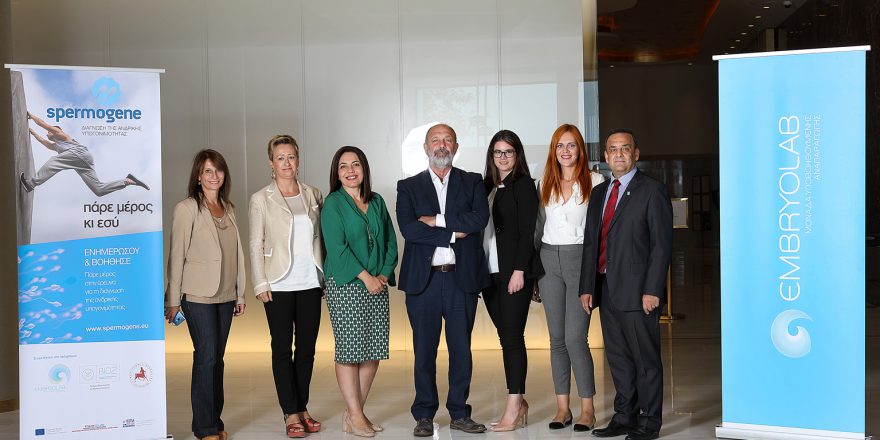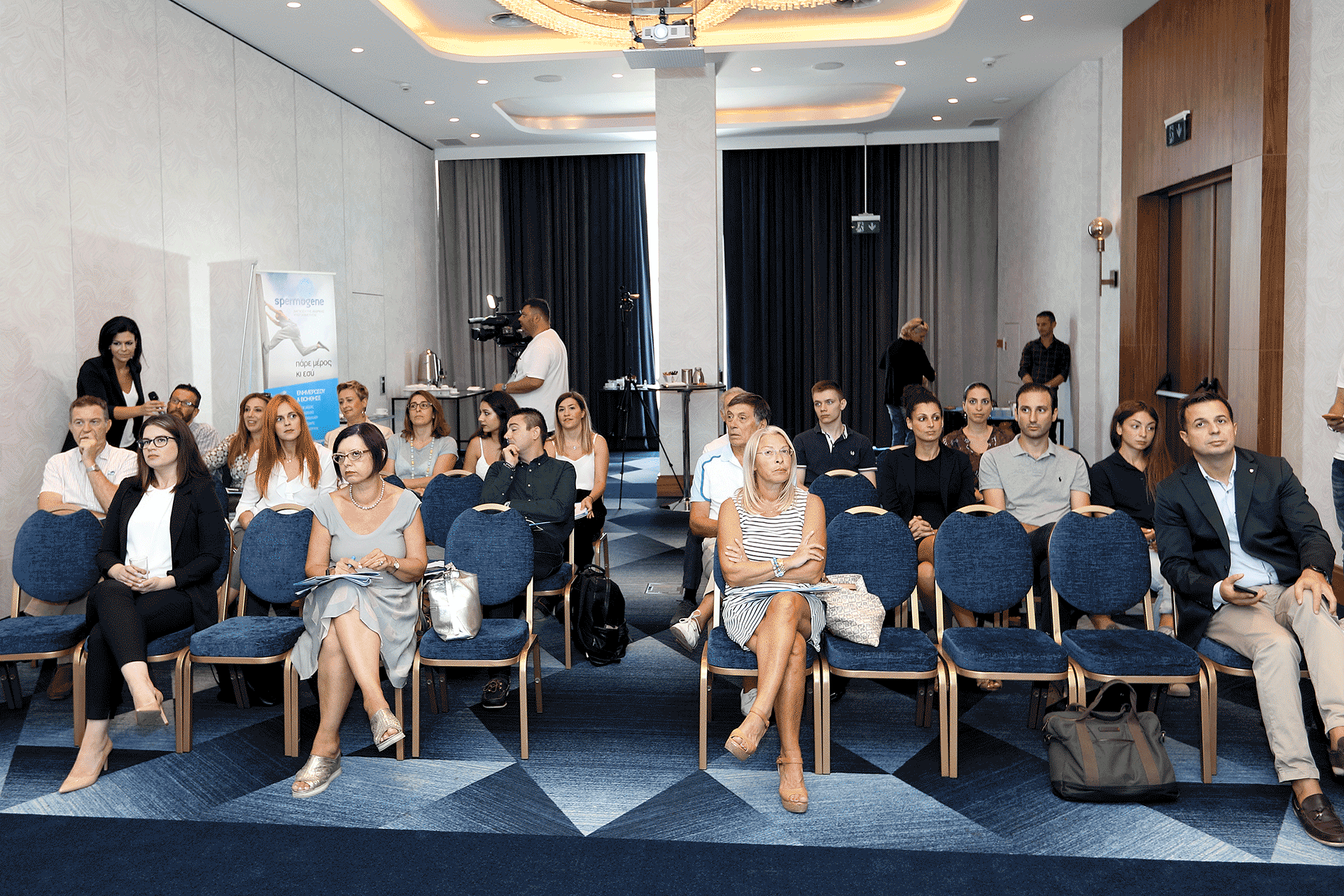
PRESS CONFERENCE
Thessaloniki, 19 September 2018
In light of the fact that low fertility affects 15% of couples, bringing with it a series of problems which impact on couples’ psychology with its concomitant serious social and economic repercussions, ΒΙΟΖ – The Laboratory of Genetics at the University of Thessaly – in collaboration with the assisted reproduction unit, Embryolab, are carrying out for the first time in Greece a research programme concerning the diagnosis of male infertility.
As has been recorded, in 50% of cases the cause is to be found in a fertility disorder in the man, and the majority of couples resort to assisted reproduction to produce biological offspring.
Up to now, diagnosing male infertility has initially been performed through a spermodiagram which determines the number, motility and speed of the spermatozoa. However, it is frequently the case that this test is inconclusive in its results, therefore requiring further tests, which may be invasive, such as a testicular biopsy.
In this programme, the approach adopted by ΒΙΟΖ in collaboration with the assisted reproduction unit, Embryolab, concerns the valid, fast and non-invasive diagnosis of low fertility in men, based on the idea that fertility disorders stem from a genetic background, that is to say, specific mutations of the genetic material trigger low fertility. The objective is that a holistic analysis of these mutations and their combinations using contemporary techniques and tools will lead to the building up of a genetic profile for each low fertility category, and which can be ‘read’ through a simple test.
This test will be carried out by simply taking a blood sample from the man which will then place each one in a sperm category, whether that be healthy or not, according to the genetic profile.
The test will be sensitive, will limit the errors in distinguishing between categories and will provide information which is not available with current analyses, so as to draw up a plan for carrying out procedures leading to a successful pregnancy.
We are looking for 1000 volunteer sperm donors
To carry out this project, a minimum of 1000 men between the ages of 18 and 40 are needed to give blood and sperm for analysis.
The whole procedure of giving genetic material lasts an hour, and volunteers can visit Embryolab at 173-175 Ethnikis Antistaseos in Thessaloniki. The telephone number is +30 2310474747
Should they wish, they can be informed about their fertility through a spermogram done at Embryolab. The sample will thereafter be analysed by BIOZ- The Laboratory of Genetics at the University of Thessaly.
Throughout the programme, complete confidentiality will be observed and all sensitive data of those taking part will be protected.
The present DNA tests
There are already DNA tests based on pre-existing mutations, which may affect sperm quality. These are companies with headquarters in Germany, Japan and the USA, which offer DNA test packages concerning specific mutations or a specific number of genes which according to the literature affects fertility.
The approach of the above companies is somewhat unsatisfactory as the results of these genetic tests concern isolated mutations, and thus are not always informative or definitive when it comes to fertility since low fertility relates to multiple mutations and genetic correlations.
A different approach
ΒΙΟΖ’s and Embryolab’s approach is holistic and will be based on the analysis of the whole genome and not just on individual genes, and thus will shed light on the most complex genetic and mutation correlations which affect and determine male fertility.
Therefore, participation in the programme will not only offer valuable assistance in producing the diagnostic test itself, but in terms of assisted reproduction, the new database, which will be designed specifically for the Greek population, will permit a better understanding of hereditary mutations and consequently will be able to determine with precision the likelihood of offspring carrying the specific mutations.
Furthermore, new scientific data will contribute both to a better understanding of the genetic basis of male infertility as well as to developing methods for diagnosing and treating it.
The Scientific Team
The main research team consists of Professor, University of Thessaly, Rector, University of Thessaly, Zisis Mamouris, Associate Professor, Aikaterini Moutou, Assistant Professor, Theologia Sarafidou, Assistant Professor, Anna-Maria Psarra, Maria Markantoni, PhD Candidate
The Laboratory of Genetics of the School of Biochemistry and Biotechnology, University of Thessaly and from the Embryolab Laboratory, Alexia Chatziparasidou, Senior Clinical Embryologist and Director of Embryolab.
Project Identity
The project, titled: ‘Male fertility: genomics, proteomics and diagnosis. From the lab bench to the patient’, is being carried out in the framework of the Single Action RTDI ‘RESEARCH – CREATE – INNOVATE and is being undertaken by BIOZ- The Laboratory of Genetics at the University of Thessaly in collaboration with the Assisted Reproduction Unit, Embryolab, which is based in Thessaloniki.
Contact
For further details, please contact www.spermogene.eu
Enquiries: Vaso Petridou, 2310 474747, 6985735555, info@spermogene.eu
Statements from the Project’s Coordinating Committee
Zisis Mamouris,Professor, University of Thessaly, Rector, University of Thessaly, zmamuris@gmail.com
Since their first scientific collaboration in 2013, BIOZ and Embryolab have remained mutual partners in solid inspiration, innovation and creativity. Our objective was and remains to open doors to improving our everyday lives and our lives as a whole by using the driving force of science and innovation.
Since its formation in 2009, BIOZ has been serving all those areas to which genetics can address itself, the goal of BIOZ’s members being excellence in research and a high level of teaching. BIOZ also has a mission to contribute to society through its dedicated interaction with the various parts of society.
The latest collaboration between BIOZ and Embryolab sets out to both further innovation and entrepreneurship as well as to develop research on many levels. Our final recipients will always be people; it is improving the quality of their lives that counts.
ΒΙΟΖ comes into this collaboration with high expectations, believing the dynamics of creation it possesses will yield brilliant results.
Alexia Chatziparasidou, Sr. Clinical Embryologist, Director of Embryolab, a.chatziparasidou@embryolab.eu
Today, one in 6 couples confront difficulties in conceiving, while male infertility represents the main cause in 40% of cases. Currently, the treatments available to regain fertility have a small rate of success, meaning that the majority of men are referred to IVF procedures to have children.
For Embryolab’s team of scientists, Spermogene is a marvelous challenge. With the coordinated action of the scientists from the University of Thessaly, Spermogene is fighting alongside today’s man and seeks answers.
The answers will lead us for the first time to effective solutions with regard to diagnosing as well as treating male infertility.
This innovative research programme will be based on data deriving from volunteers’ sperm and blood samples.
Today following the official commencement of the programme, we call on all men from the ages of 18 to 40 who wish to support our efforts to face up to and overcome the scourge of male infertility, a problem which impacts on the lives of millions of men in Greece and throughout the world!
Though the programme will be running for three years (until 2021), the faster we collect the required number of samples, the faster we will find the answers. We will be needing the support of volunteers for this purpose, since science will be basing itself on them to reveal knowledge which will lead us to an effective treatment and to restoring male fertility.
Dimitris Nikolaidis, Ph.D., Project Manager, General Director, Embryolab, d.nikolaidis@embryolab.eu
Since it was founded in 2004, Embryolab has always placed the individual at the centre of its operations. We have never had aspirations to become the largest assisted reproduction unit in the country. We do however always want to be the best in what we do, that is giving joy to couples, offering the best of ourselves and being of service to each and every person. We believe we demonstrate this daily, and the joint research programme, Spermogene, with the University of Thessaly in the framework of the action ‘RESEARCH – CREATE – INNOVATE once more underlines this philosophy of ours.
Working with an educational institution of the prestige of the University of Thessaly is both an honour and a challenge for us. Such joint efforts can present new vistas which may bring multiple benefits:
- Innovative products and services
- New research data which will help people and provide solutions to chronic problems
- New employment opportunities
Through pursuing clear research and entrepreneurial goals guided by vision and ethics, we can open up new scientific horizons and offer new data in an as yet little researched field. Actions such as these give hope and blaze trails for greater synergies amongst enterprises and university institutions.
There are multiple benefits. At Embryolab, the research culture is further strengthened as well as the skills of our people, who are trained in new techniques and methods. Our outward-looking profile is thereby further enhanced, and in a world continuously on the move, we are building new facts on the ground for development with young scientists as well as research and university institutions
Embryolab is delighted to be working jointly with the University of Thessaly.
This may only be the start of a new era in Research in Male infertility.






